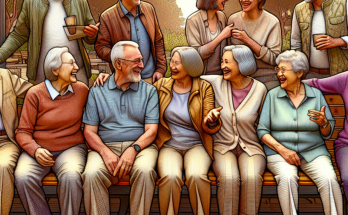Friendship. It’s one of the most fundamental human experiences, yet scientists are only beginning to understand the profound impact friendship has on our bodies and brains. As social creatures, we yearn for connection with others. And an expanding body of research suggests that social bonds not only bring us happiness—they can help us live longer, healthier lives.
The Biological Urge to Connect
The desire to make friends is innate. Our brains are wired for social interaction through an interconnected web of neurons that influence behavior, emotions, and thoughts.
Researchers have identified the brain’s ventral striatum, a region activated by rewarding experiences, as integral to friendship formation. When we meet someone we click with, this pleasure center floods our brains with dopamine, causing that elated, “high” feeling of forging new bonds.
Oxytocin, also dubbed the “love hormone,” surges when we hug or laugh with friends. It eases stress, calms our nervous system, inspires trust and generosity. Studies reveal oxytocin even prompts us to favor our friends in social situations.
Simply put, our brains equate social interaction with feel-good chemicals. This built-in reward system powers our urge to seek companionship, driving us to establish life-long friendships that offer comfort, reassurance and fun.
Key Benefits of Strong Friendships
| Benefit | Description |
|---|---|
| Reduced stress | Laughing and spending time with friends releases oxytocin and dopamine, calming the nervous system |
| Improved heart health | People with strong social ties have a 50% lower risk of death from cardiovascular issues |
| Increased immunity | Spending time with friends lowers inflammatory proteins linked to arthritis, diabetes, and other illnesses |
| Faster surgery recovery | Those with a solid support system tend to heal quicker after medical procedures |
| Healthier behaviors | Friends help improve eating, exercise, and lifestyle habits through camaraderie and support |
| Better mental health | Friends can decrease depression, help cope with grief/change, and provide therapy support |
| Cognitive protection | Meaningful social bonds may help reduce memory loss and cognitive decline later in life |
| Longer life expectancy | Insufficient social connection has been shown to be as detrimental to longevity as smoking 15 cigarettes per day |
Friends Protect Our Health
A heaping dose of feel-good neurochemicals isn’t the only perk that comes from friendship. Evidence links strong social ties with reduced inflammation and improved immune function. In a study by UCLA researchers, subjects who felt lonelier over a 5-year period showed higher levels of an inflammatory protein. Chronic inflammation can exacerbate arthritis, diabetes and heart disease. But close friendships help guard against this.
Data compiled over three decades shows adults with strong social bonds have a 50% lower risk of death across the study period compared to their more isolated peers. Wide-spanning research has found people with fulfilling friendships:
- Have a greater chance of surviving cancer and heart attacks
- Recover faster from surgery
- Experience less cognitive decline in old age
- Cope better with stress, trauma and loss
While researchers are still untangling the precise biological mechanisms, it seems our bodies function optimally when we feel socially secure. Our nervous systems relax. We make healthier lifestyle choices. We have an outlet to process challenging experiences. And we have companionship to lift our mood.
Forming High-Quality Bonds
Not all social ties impact health equally. Measurable benefits come from intimate friendships defined by trust, empathy and warmth. These bonds allow us to feel truly seen and understood.
While amassing Facebook friends or mingling at parties can be fun, these interactions do not always provide the depth of support shown to fortify health. But what constitutes a close friendship? Researchers propose:
- Mutual confiding and disclosure of personal information
- Expressions of trust, loyalty and authenticity
- Shared laughs, jokes and enjoyment
- Comfort talking about problems or seeking advice
- Reliable companionship and reciprocal acts of kindness
Psychologists emphasize that high-quality friendships take time and investment to develop. We strengthen bonds through consistency, dependability, and vulnerability. This allows friends to feel safe, seen, and valued.
Studies show proximity also helps. People who interact frequently tend to form stronger social ties. As such, researchers encourage making regular time for friends, whether over coffee, exercise, shared hobbies, or low-key hangouts. Dedicating effort to nurture friendships can yield great dividends for our health.
Supporting Friends Through Hard Times
When friends endure challenges, their social ties become vital lifelines. Joining a support group decreases depression symptoms more than cognitive behavioral therapy.
Supporting each other through grief, illness, career changes, and other trials deepens bonds. Listening without judgment, offering encouragement, and celebrating small steps can uplift friends when they’re down. Even just sending texts or cards reminding friends they’re not alone can help tremendously.
However, don’t withdraw if your friend seems sad or preoccupied. Studies reveal depressed individuals with shrinking social circles show worse outcomes. Make an extra effort to maintain contact. Let them know you care, even if they seem defeated or withdrawn in the moment. Your support could positively influence treatment and recovery.
The Takeaway
Decades of research emphasizes that friendship substantially impacts wellbeing. While genetics influence health, few things more profoundly determine mortality risk and life satisfaction than social integration. Prioritizing meaningful companionship could be similarly vital as eating well or exercising.
So reach out to old friends you’ve lost touch with. Make regular dates with those closest to you. Show interest in their lives and share yours too. Give your time, empathy and compassion freely. The rewards of friendship don’t just feel good—they fortify us for the long haul. Our hearts, minds and even biology are keyed to thrive when we have quality bonds giving us comfort, joy and support.




